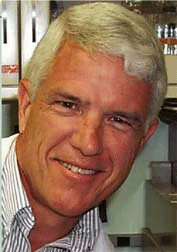SAN DIEGO-The remarkable new tools of the genomic generation have been used by researchers at the House Ear Institute in Los Angeles, Translational Genomics Research Institute in Phoenix, and the University of Antwerp, Belgium, to zero in on genes that cause presbycusis, or age-related hearing loss.
Explore This Issue
June 2007Rick A. Friedman, MD, PhD, of the House Ear Institute, described the scientists’ work at the Triological Society’s Otology Forum April 26 at the Combined Otolaryngology Spring Meetings. He and his collaborators (not in attendance at COSM) studying the genetics of presbycusis included Dietrich Stephan, PhD, of Translational Genomics, Guy Van Camp, PhD, University of Antwerp, and the company Affymetrix.
While tempting the hundreds of COSM attendees with this exciting, sneak-peek look at the yet unpublished research, Dr. Friedman also explained the rationale behind genomic studies into complex traits where multiple pathways lead to common diseases such as hypertension, diabetes, and presbycusis.
His presentation was the lead talk in the research update. Additional presenters included Neil Segil, PhD, also from the House Ear Institute, who discussed the potential of hair cell regeneration with endogenous progenitor cells-specifically supporting cells; Allen Ryan, PhD, Professor of Otolaryngology at the University of California, San Diego (UCSD), who addressed the progress and challenges of stem cell therapy for the inner ear; and Bryan A. Liang, MD, PhD, JD, a medical ethics and legal expert based in San Diego, who reminded colleagues about liability, medical board sanctions, and the slime factor associated with judgment errors in today’s cutting-edge, genomic basic and clinical research.
Whole Genome Association Studies
Noting that his goal in organizing the forum was to convey the importance of this era of genomic medicine and potential stem cell therapies, Dr. Friedman based his remarks on his recent whole genome association studies. He said that since common diseases such as presbycusis result from common variations within the human genome, special tools are needed to detect the subtle differences that result in a variation of the expression of the gene, but not necessarily by its absence.
Key to the discovery of these subtle differences was the Affymetrix DNA microarrays, tiny silicon microchips with 500,000 bits of DNA information. The newest version of these microarrays was utilized by Dr. Friedman and his team as they searched for the gene or genes responsible for age-related hearing loss. The genes of more than 800 European subjects (with and without presbycusis) were subjected to the analysis of single nucleotide polymorphisms (SNPs) in an expensive ($1,000 per chip) study. The team has identified several markers at locations throughout the genome, all showing statistical significance and interplay to create the genetic risk for presbycusis.


Leave a Reply